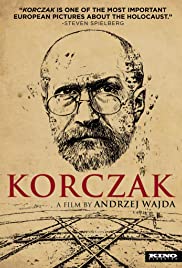
KORCZAK
Poland, Germany, France, 1990, 118 minutes, Colour.
Wojteck Pszoniak.
Directed by Andrzej Wajda.
Korczak is a co-production, a sign of European unity at the beginning of the '90s.
The film was directed by Andrzej Wajda, the celebrated Polish director from the '60s to the '90s (Man of Marble, Man of Iron, Danton). The screenplay was written by Agnieszka Holland (To Kill a Priest, Europa Europa). The film was shot in strong black and white by Robbie Mueller.
The film is a memoir of Poland in the '30s and during World War Two, especially the Warsaw ghetto. It is a tribute to Dr Janusz Korczak, a man noted for his treatment of children - both medically and as an educator and storyteller. The film shows him at work, under pressure from the Nazis, withdrawing orphans to the Warsaw ghetto, having to scrounge for their survival, get the help of racketeers, challenge collaboration with the Nazis - all to little effect as he and the children are put, finally, on a train for Treblinka concentration camp.
The film is excellently acted, especially by Wojtek Pszoniak as Korczak. (Pszonian was very effective as Robespierre in Danton.)
45 to 50 years after the events, the film is a sombre picture for the European audience of the '90s.
1. The work of Wajda, his films in Poland and outside Poland? In harmony with Solidarity, persecuted during the '80s? His issues and concerns? For the '90s?
2. The film as a European co-production, Europe looking at its past, concerned about its future?
3. The black and white photography, Poland in the '30s, the Warsaw ghetto, the experience of war? The film's focus on the Nazi newsreel-makers, their film, filming, editing and framing their work for their message? As Wajda does?
4. Korczak becoming legend - as a doctor, kindness towards children? The effect of Nazism, the horror and cruelty? The final train ride - with the epilogue and the children going to freedom (and the unheard song they are singing)?
5. The portrait of Korczak, as a person, age, personality, presence? The radio broadcasts, the authorities closing him down, his reactions? The other broadcasters and their squabbles? His concern with young people, educator, storyteller? The running of the orphanage? His friend Stefania returning from Palestine? The late '30s and the possibilities of going there as a refugee? His decision to stay? His self-assertion as a doctor, wearing his uniform? Attacked and beaten by the Nazis? The sympathetic doctor trying to arrange his escape? His sanding fast? Stefania and her help?
6. The move to the ghetto, the children, the squalor? His begging for the children, wealthy friends? The politics within the ghetto, the Nazi sympathising - the inevitable interchanges for survival? Czerniak and the clashes, his wanting to help Korczak?
7. The group of people joining Korczak? The mother persuading him to take her son, Szloma, his delinquency, thieving? His mother's death? His support of Korczak? Abramek, his girlfriend leaving him because he's Jewish, his finding Natka? Estera and Heniek? In love, the marriage plans, Estera trapped? The looming deportation? The help of the racketeer Itzek? Going to the nightclub, the demands for giving money? The criticism for such money? Korczak and his strong stance?
8. The deportation, Czerniak and his attempts to not sign the deportation orders, the pressure from the Nazis? The false papers and help by Itzek? Czerniak dead at his desk?
9. The deportation of the children, the train to Treblinka - and the images of the ending?
10. A portrait of an eastern European world, Poland in the '30s, the threat of Nazism, the persecution of the Jews? The role of children?
11. Korczak as doctor, healer, educator and transformer? Crusader?